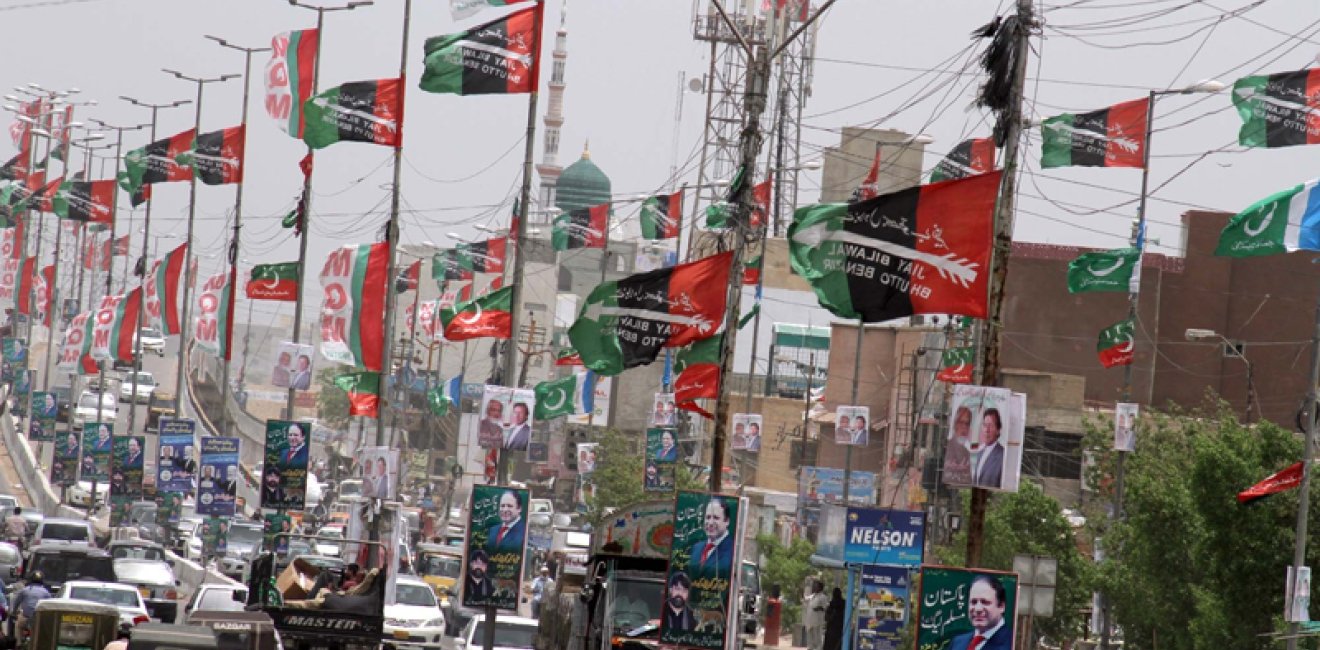
A blog of the Indo-Pacific Program
In the final blitz before the election, expect two loud narratives to remain dominant—and, in the process, to drown out a number of key election storylines.
It’s no surprise, given the sky-high degree of political polarization in Pakistan, that two clashing narratives are dominating the country’s public discourse in the lead up to a national election on July 25.
For the incumbent Pakistan Muslim League-Nawaz (PMLN) and its supporters, the country is experiencing nothing short of a silent coup. They accuse—without specifically naming—the country’s powerful military of engineering actions behind the scenes that are meant to undercut the PMLN’s electoral prospects. The PMLN leadership and military have clashed for several years, particularly after former prime minister Nawaz Sharif pushed for better relations with archenemy India and criticized the army for failing to take more robust action against terrorists on its soil.
About a year ago, Pakistan’s supreme court disqualified Sharif from power over corruption allegations. Earlier this month, he and his daughter Maryam—another top party leader—were sentenced to prison. On July 13, both were arrested, and they are now in jail. For the PMLN and its backers, this represents selective justice administered by an activist judiciary with the prodding of the military.
The ultimate objective, according to this narrative, is to taint the PMLN in the eyes of the Pakistani public and weaken its electoral prospects. Accordingly, other recent developments are also indications of the military’s efforts to make the PMLN an election liability. These developments include ordering the arrests of PMLN supporters and pressuring PMLN parliamentarians to switch their allegiances to the Pakistan Tehreeek-e-Insaf (PTI)—the PMLN’s main competitor and a party that gets along well with the military. For the PMLN and its supporters, the military is bent on creating the electoral conditions for the PTI to lead the next government.
For backers of the PTI and of the military, the PMLN-supported narrative is pure bunk. The PMLN’s problems are a product not of a deep state-led conspiracy, but rather of the party’s sheer incompetence—not to mention its deep levels of corruption. The legal process against the PMLN is a resounding example of accountability and democracy, not military meddling.
Meanwhile, according to this second narrative, the PTI is gaining momentum not because of any military-led machinations behind the scenes, but because it is an increasingly popular party that has galvanized Pakistani society with its anti-corruption messaging and its embodiment of something refreshingly new: an incorruptible, non-dynastic political party. Champions of this narrative angrily reject the assertions of PMLN supporters that the July 25 poll is a foregone conclusion—a “selection” more than an election that will put the military’s preferred party, the PTI, in power. On the contrary, PTI and military supporters argue that this will be a free and fair election—and that the PTI will win it.
In all likelihood, the truth lies somewhere in between these two narratives.
In all likelihood, the truth lies somewhere in between these two narratives. Pakistan’s military—Pakistan’s most powerful political player—isn’t about to take a back seat, much less disappear from the scene, anytime soon. At the same time, not everything is a conspiracy. Pakistan’s judiciary and the PTI exercise plenty of agency, and their actions need not always be stage managed by an ever-present security establishment.
This more reasonable and less sensationalistic middle ground may be closer to the truth, but it’s also unlikely to generate headlines or galvanize political party rank and files. And so, in the final blitz before the election, expect the two loud narratives to remain dominant—and, in the process, to drown out a number of key election storylines.
These storylines include the strong likelihood that the July 25 election will mark the second consecutive time—following the previous national election in 2013—when Pakistan experiences a peaceful transfer of power. For a nation with a deep legacy of military rule, in which the army has run the country for nearly half of its 70-year existence, two consecutive terms of uninterrupted civilian rule are nothing to sneeze at.
Additionally, if the PTI wins the election, then Pakistan’s national government, for one of the few times in its modern political history, will be led by a party other than the Pakistan Muslim League or Pakistan People’s Party—the country’s two most established and dynastic parties. The PTI, which is barely 20 years old, is neither established nor dynastic.
There are other big story lines in the election as well, both heartening and troubling. These range from get-out-the-vote initiatives targeting young and female voters to the emergence of new hardline religious parties harboring violent views that have entered the electoral fray.
But this will all take a back seat to the battle of narratives being waged between the incumbent party and the party with the greatest chance to unseat it.
Image: Asianet-Pakistan/Shutterstock.com
The views expressed are the author's alone, and do not represent the views of the U.S. Government or the Wilson Center. Copyright 2018, Asia Program. All rights reserved.
Author


Indo-Pacific Program
The Indo-Pacific Program promotes policy debate and intellectual discussions on US interests in the Asia-Pacific as well as political, economic, security, and social issues relating to the world’s most populous and economically dynamic region. Read more





